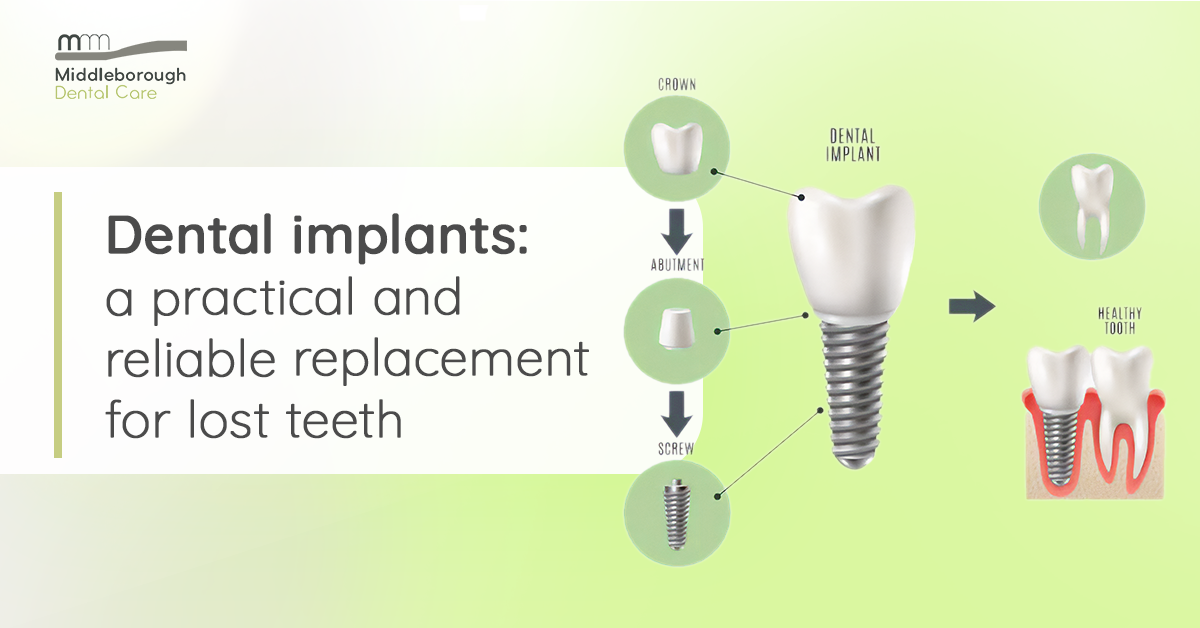
Dental implants: a practical and reliable replacement for lost teeth
Dental techniques, materials, and technology have come a long way over the past couple of decades. Nowadays, replacing a badly damaged natural tooth with a dental implant is a common procedure.
A dental implant is essentially an artificial tooth – although, to be accurate, the implant replaces the roots of a tooth while a crown atop the implant replaces the visible tooth.
When a natural tooth can’t be filled or won’t support a crown, a dental implant provides a new structure in your mouth that will give a customised crown a robust base.
It’s a simple concept, however, the complexity of the procedure depends on a range of factors, not least the health of the jawbone into which the implant is being affixed.
Dr Alice recently attended a workshop to update her knowledge on implant procedures, so we’ve taken that as a prompt to share some information on the subject!
The basics of dental implants
The implant is a metal fixture, most commonly in the form of a screw, which is placed in the jawbone to act as an anchor for a crown.
There is also a third part, known as an abutment, which connects the crown to the implant.
Most dental implants are made from titanium. This is an ideal material as it’s lightweight, non-magnetic, and resistant to corrosion.
The crown that is attached to the implant is custom-made not only to fit perfectly between the natural teeth on either side of it but also to look as much like those adjacent teeth as possible.
The completed procedure is referred to as an implant-supported crown.
With regular hygiene maintenance, most implants can last 20 to 30 years. Depending on how much of your daily biting and chewing load it takes, parts of an implant might get loose or worn over time, so it may need some occasional maintenance or restoration.
There are some ‘variables’
While many dental implant procedures are quite similar, there are a few things we need to take into account in each case.
For example, some patients need more preparatory work done than others. Where the implant is going within your mouth, the health and position of the adjacent teeth, and the density of the jawbone at the implant point all need to be assessed.
There are also instances where more than one tooth is being replaced at the same time, in which case we might require two screws to support a ‘bridge’ including three crowns.
Implants may not always be viable
Before we can decide on whether implant surgery is the way to go, we take an x-ray of the patient’s jaw. This gives us a clear picture of whether there is enough dense bone tissue at the point of the implant to give us the best chance of a successful procedure.
If the bone quality and quantity isn’t good enough, we might discuss the option of bone grafting to build it up to a suitable density.
We also have to look out for periodontal disease (a form of gum disease) which can reduce the success rate of implant surgery.
Anyone who smokes might not be a suitable candidate for implant surgery. At the very least, they have to cut down on smoking for several months during the healing phase.
How much will it cost?
Middleborough Dental Care is able to complete most routine dental implant procedures, from start to finish, for around $5000.
Because most of our cases are done in-house at our clinic, with no need for patients to attend other locations, our costs are manageable.
However, in some more complex cases, we will work with specialist colleagues, which will add to the cost.
What you need to know about the dental implant procedure
Before implant surgery can begin, we need to extract the existing tooth and prepare the jaw for the implant.
If we haven’t already determined the most suitable implant for your needs, we will finalise this decision when we see the placement.
We will arrange to have a crown designed to closely resemble the shape and colour of the original tooth and fit as seamlessly as possible alongside the adjacent natural teeth.
It usually takes three to five separate visits to the dentist over a period of around three months to complete the entire procedure.
The advantages of doing it all in-house
There are several elements to the implant-supported crown process: x-rays, impressions, extraction, the implant procedure, a check-up, and the permanent crown fitting.
The Middleborough Dental Care team always starts with a thorough assessment so that we can let you know, firstly, whether we will be able to complete the entire process ourselves and, secondly, what treatment plan will suit you.
We have given many patients implant-supported crowns and we find that everyone is pleased to get a reliable, practical replacement that looks and feels like all their other teeth.
If you have any questions about dental implants – or any other treatment or procedure – we’re always happy to answer them and discuss the best option for you.